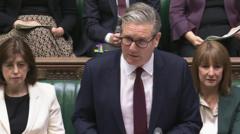Will Starmer Implement a Tax Threshold Freeze?

Understanding the Implications of Tax Threshold Freezes in the UK: A Deep Dive
The current political landscape in the UK is witnessing a significant debate around tax thresholds, particularly as the freeze on National Insurance (NI) and income tax thresholds is set to continue until April 2028. This freeze, initially introduced by the Conservative government, has far-reaching implications for millions of taxpayers across the nation. In light of recent statements by Sir Keir Starmer during Prime Minister's Questions, the future of this freeze remains uncertain. This article aims to provide a comprehensive overview of the tax threshold freeze, its implications, and the potential consequences for taxpayers in the UK.
What Are Tax Thresholds?
Tax thresholds are specific income levels that determine when an individual begins to pay income tax or National Insurance contributions. These thresholds are crucial, as they dictate the tax burden placed on individuals based on their earnings. In the UK, both income tax and National Insurance operate on a tiered system, meaning that different portions of an individual's income are taxed at different rates.
Current Tax Thresholds
As of the 2023/24 tax year, the income tax and National Insurance thresholds are as follows:
- Personal Allowance: £12,570 (the amount you can earn before paying income tax)
- Basic Rate Tax Band: £12,571 to £50,270 (earning within this range is taxed at 20%)
- Higher Rate Tax Band: £50,271 to £150,000 (income in this bracket is taxed at 40%)
- Additional Rate Tax Band: Over £150,000 (taxed at 45%)
For National Insurance, the primary thresholds are:
- Primary Threshold: £12,570 (the amount you can earn before paying National Insurance)
- Upper Earnings Limit: £50,270 (income above this is taxed at a lower rate of 2%)
The Freeze on Tax Thresholds
The freeze on tax thresholds was first implemented in the 2021/22 tax year, and it was intended to last until April 2028. This means that, despite inflation and rising living costs, the thresholds will not be adjusted upward. Consequently, many individuals are already beginning to feel the effects of this freeze as their wages increase due to inflation or promotions, pushing them into higher tax brackets.
Impact on Taxpayers
The implications of extending the freeze until 2029/30 are profound:
- Increased Tax Burden: As wages rise, more people find themselves subject to income tax and National Insurance contributions for the first time, or they may be pushed into higher tax bands.
- Loss of Disposable Income: With more of their earnings being taxed, individuals have less disposable income, affecting their spending power and overall economic health.
- Impact on Low and Middle-Income Earners: The freeze disproportionately affects low and middle-income earners, who may not see significant wage growth to match inflation.
Political Responses and Commitments
Sir Keir Starmer's recent comments during Prime Minister's Questions have drawn attention to the Labour Party's stance on tax thresholds. While he reaffirmed Labour's manifesto pledge not to increase National Insurance, income tax, or VAT, he did not explicitly commit to lifting the freeze on tax thresholds. This ambiguity raises questions about Labour's approach to fiscal policy and its commitment to supporting working families.
Government Fiscal Rules
The government's fiscal rules, which include not borrowing to fund day-to-day spending and reducing government debt as a share of national income by 2029/30, are designed to instill confidence in financial markets. However, adhering strictly to these rules may necessitate tax increases, further complicating the economic landscape for the average taxpayer.
Economic Context and Potential Future Changes
The current economic climate in the UK is characterized by rising inflation, increasing living costs, and significant government spending pressures. With recent U-turns on disability benefits and winter fuel payments, the government is under increasing scrutiny regarding its spending plans.
Predictions for the Autumn Budget
Economists predict that the upcoming autumn Budget may bring about tax rises as the government seeks to balance its books amid growing expenditure demands. The potential extension of the tax threshold freeze could raise an estimated £7 billion a year, raising concerns about equity and fairness in the tax system.
The Broader Implications of Tax Policy
Tax policy plays a crucial role in shaping the economy and influencing individual financial well-being. The decision to freeze tax thresholds reflects broader economic strategies and priorities. It raises critical questions about the balance between fiscal responsibility and the need to support citizens in an increasingly challenging economic environment.
Exploring Alternatives
As discussions around tax policy continue, it is essential to explore alternative strategies that could mitigate the adverse effects of the tax freeze. These may include:
- Adjusting Tax Thresholds: Regularly adjusting tax thresholds in line with inflation could prevent taxpayers from being pushed into higher tax bands unnecessarily.
- Targeted Tax Reliefs: Implementing targeted tax reliefs for low and middle-income individuals could alleviate financial strain while ensuring fiscal stability.
- Progressive Taxation: Reassessing the overall tax structure to ensure a more progressive approach may help distribute the tax burden more equitably.
Conclusion: The Path Forward
The ongoing discussions around the freeze on tax thresholds highlight significant challenges facing the UK government and its citizens. As the political landscape evolves, it will be crucial for policymakers to consider the implications of their decisions on everyday taxpayers. The delicate balance between fiscal responsibility and social equity remains at the forefront of this debate.
As we move towards the autumn Budget, taxpayers will be watching closely to see how the government navigates these complex issues. With the potential for tax rises looming, the stakes are high for millions of working individuals and families across the UK.
FAQs
What is the current freeze on tax thresholds in the UK?
The current freeze on tax thresholds, affecting both income tax and National Insurance, has been in place since the 2021/22 tax year and is set to last until April 2028.
How does the freeze affect taxpayers?
The freeze means that as wages rise, more individuals may find themselves in higher tax bands, resulting in increased tax burdens without any adjustments to the thresholds.
What are the potential consequences of extending the freeze?
Extending the freeze could raise an estimated £7 billion annually, impacting low and middle-income earners by increasing their effective tax rates as inflation continues to rise.
As the government grapples with these pressing issues, the decisions made in the coming months will shape the future of taxation in the UK. Will the government prioritize fiscal discipline over the well-being of its citizens? Only time will tell. #TaxPolicy #UKEconomy #SirKeirStarmer
Published: 2025-07-09 12:46:04 | Category: sport



